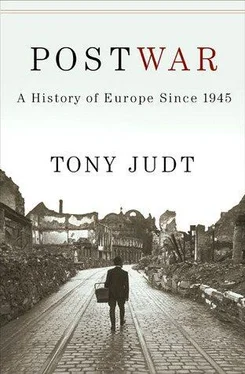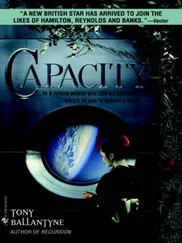On June 23rd, the Soviet authorities responded by issuing a new, East German Mark and cutting the rail lines linking Berlin to western Germany (three weeks later they would close the canals as well). The following day the Western military government in Berlin blocked Soviet efforts to extend the new Eastern zone currency to West Berlin—an important point of principle, since the city of Berlin was under four-power rule and the Western zone had not hitherto been treated as part of Soviet-occupied eastern Germany. As the Soviet troops tightened their control over surface connections into the city, the American and British governments decided upon an airlift to provision their own zones and on June 26th the first transport plane landed at Tempelhof airfield in (West) Berlin.
The Berlin airlift lasted until May 12th 1949. Over those eleven months the Western allies shipped some 2.3 million tons of food on 277,500 flights, at the cost of the lives of 73 Allied airmen. Stalin’s purpose in blockading Berlin was to force the West to choose between quitting the city (taking advantage of the absence in the Potsdam protocols of any written guarantee of Allied surface access to it), or else abandoning their plans for a separate West German state. This was what Stalin really wanted—Berlin for him was always a negotiating chip—but in the end he secured neither objective.
Not only did the Western allies hang on to their share of Berlin (somewhat to their own surprise, and to the amazed gratitude of the—West—Berliners themselves), but the Soviet blockade, following hard on the Prague coup, only made them more determined to move ahead with plans for West Germany, just as it made a division of the country more acceptable to Germans themselves. France joined the Bizone in April 1949, creating a single West German economic unit of 49 million inhabitants (against just 17 million in the Soviet Zone)
Like most of Stalin’s diplomatic adventures the Berlin blockade was an improvisation, not part of any calculated aggressive design (though the West could hardly be blamed for not knowing this at the time). Stalin was not about to go to war for Berlin. [40] Had he wished to do so, there was little practical impediment. In the spring of 1948 the Soviet Union had three hundred divisions within reach of Berlin. The US had only 60,000 soldiers in all of Europe, fewer than 7,000 of them in Berlin.
Accordingly, when the blockade failed, the Soviet leader changed tack. On January 31st 1949 he publicly proposed lifting the blockade in exchange for a postponement of plans for a West German state. The Western allies had no intention of making any such concession, but it was agreed to convene a meeting to discuss the matter and on May 12th the Soviet Union ended the blockade in exchange for nothing more than a conference of Foreign Ministers scheduled for May 23rd.
The conference duly took place and lasted for a month, but predictably found no common ground. Indeed it had only just begun when the West German parliamentary council in Bonn formally passed into effect the ‘Basic Law’ establishing a West German government; a week later Stalin responded by announcing plans for a complementary East German state, formally created on October 7th. [41] The Basic Law was deliberately provisional —‘to give a new order to political life for a transitional period’: i.e. until the country was reunited.
By the time the conference broke up, on June 20th, the military government in West Germany had been replaced by High Commissioners from the US, Britain and France. The Federal Republic of Germany had come into being, though the Allies reserved certain powers of intervention and even the right to resume direct rule if they judged it necessary. On September 15th 1949, following his Christian Democratic Party’s success at the elections a month earlier, Konrad Adenauer became the Republic’s first Chancellor.
The Berlin crisis had three significant outcomes. In the first place, it led directly to the creation of two German states, an outcome none of the Allies had sought four years earlier. For the Western powers this had become an attractive and attainable objective; indeed, for all the lip service thenceforth paid to the desirability of German unification, no-one would be in any hurry to see it happen. As the British Prime Minister Harold Macmillan replied to President Charles De Gaulle nine years later, when De Gaulle asked how he felt about a united Germany: ‘In theory. In theory we must always support reunification. There is no danger in that.’ For Stalin, once he appreciated that he could neither compete with the Allies for the allegiance of the Germans nor force them to abandon their plans, a separate East German Communist state was the least bad outcome.
Secondly, the Berlin crisis committed the United States for the first time to a significant military presence in Europe for the indefinite future. This was the achievement of Ernest Bevin, the British Foreign Minister—it was Bevin who successfully urged the Americans to lead the airlift to Berlin, once Truman had been assured by Marshall and General Clay (the US commander in Berlin) that the risk was worth taking. The French were all the less involved in the Berlin crisis because from July 18th to September 10th 1948 the country was in the midst of a political crisis with no clear governing majority in the Assemblée Nationale.
But thirdly, and this followed from the first two, the Berlin crisis led directly to a reappraisal of Western military calculations. If the West was going to protect its German clients from Soviet aggression then it would need to give itself the means to do so. The Americans had stationed strategic bombers in Britain at the start of the Berlin crisis and these were equipped to carry atomic bombs, of which the US had 56 at the time. But Washington had no established policy on the use of atomic bombs (Truman himself was especially reluctant to consider using them) and in the event of a Soviet advance US strategy in Europe still presumed a retreat from the continent.
Central and Eastern Europe after World War Two

The military rethinking began with the Czech coup. In its aftermath Europe entered a period of heightened insecurity, with much talk of war. Even General Clay, not typically given to hyperbole, shared the prevailing fear: ‘For many months, based on logical analysis, I have felt and held that war was unlikely for at least ten years. Within the last few weeks I have felt a subtle change in Soviet attitude which I cannot define, but which now gives me a feeling it may come with dramatic suddenness.’ It was in this atmosphere that the US Congress passed the Marshall Plan legislation and the European allies signed the Brussels Pact, on March 17th 1948. The Brussels Pact, however, was a conventional 50-Year Treaty binding Britain, France and the Benelux countries to ‘collaborate in measures of mutual assistance in the event of a renewal of German aggression’, whereas European politicians were becoming markedly more aware of their helpless exposure to Soviet pressure. In this respect they were as vulnerable as ever: as Dirk Stikker, the Dutch Foreign Minister, would note in retrospect, ‘We in Europe had only a verbal pledge from President Truman of American support.’
It was the British who initiated a new approach to Washington. In a speech to Parliament on January 22nd 1948, Bevin had committed Britain to engagement with her continental neighbours in a common defense strategy, a ‘Western European Union’, on the grounds that British security needs were no longer separable from those of the continent—a significant break with past British thinking. This western European Union was officially inaugurated with the Brussels Pact, but as Bevin explained to Marshall in a message of March 11th, such an arrangement would be incomplete unless extended to the concept of North Atlantic security as a whole—a point to which Marshall was all the more sympathetic because Stalin was just then applying considerable pressure on Norway to get it to sign a ‘nonaggression’ pact with the Soviet Union.
Читать дальше













